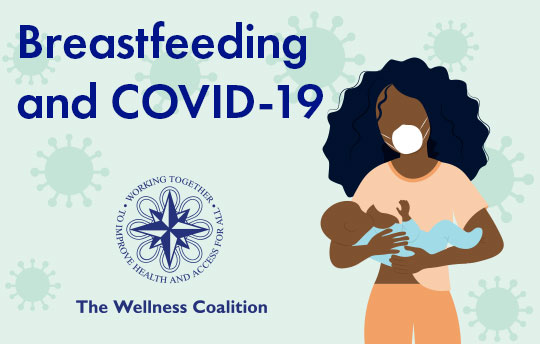 The Wellness Coalition has been supporting breastfeeding moms before and during the COVID-19 crisis. Many people we interact with have questions about breastfeeding during a pandemic. Current evidence suggests that SARS-COV-2 (the virus that causes COVID-19) is not spread to infants through breast milk. The virus spreads when an infected person breathes out droplets and very small particles that contain the virus. These droplets and particles can be breathed in by other people or land on their eyes, noses, or mouth. In some circumstances, they may contaminate surfaces they touch. So, what should you breastfeeding moms do?
The Wellness Coalition has been supporting breastfeeding moms before and during the COVID-19 crisis. Many people we interact with have questions about breastfeeding during a pandemic. Current evidence suggests that SARS-COV-2 (the virus that causes COVID-19) is not spread to infants through breast milk. The virus spreads when an infected person breathes out droplets and very small particles that contain the virus. These droplets and particles can be breathed in by other people or land on their eyes, noses, or mouth. In some circumstances, they may contaminate surfaces they touch. So, what should you breastfeeding moms do?
Should mothers continue breastfeeding if they have suspected or confirmed COVID-19 or come in contact with someone with COVID-19?
Yes. A mother’s breast milk contains antibodies and other immunological factors that can help protect her infant from infections and is the recommended source of nutrition for most infants, even while the mother is ill. Research indicates that the breast milk of mothers with COVID-19 contains antibodies and other factors that may provide protection to infants. Breastfeeding mothers with suspected or confirmed COVID-19 should follow information on isolation and take these precautions:
- Wash their hands using soap and water before touching their child or expressing breast milk either by hand expression or with a breast pump. If soap and water are not available, use hand sanitizer with at least 60% alcohol.
- Wear a mask when in close contact with the infant, such as when feeding at the breast or feeding from a bottle, and when expressing breast milk.
- Clean and sanitize breast pumps and infant feeding items.
If a mother is too sick to feed her infant at the breast and another healthy caregiver is caring for the infant, the breastfeeding mother should be encouraged and supported to regularly express her milk so that the infant continues to receive her breast milk and the mother maintains her milk supply. Healthcare providers may need to refer mothers for lactation support to learn how to maintain milk production and how to supplement with donor human milk while not feeding at the breast.
Can infants who have COVID-19 still breastfeed?
Yes. When an infant has COVID-19, the mother should be encouraged to continue breastfeeding or feeding expressed breast milk to her infant. Infants who are ill need fluids to stay hydrated and breast milk is the best option. Expressed breast milk can also be given from a cup, syringe, or bottle if the infant is unable to breastfeed directly at the breast.
Mothers who are breastfeeding a child with suspected or confirmed COVID-19 should be considered as a close contact of a person with COVID-19, and should follow CDC recommendations for what to do when exposed to COVID-19. To minimize possible exposure, precautions include:
- Wearing a mask during any close contact with the child, including while feeding or expressing milk. (Because of the danger of suffocation, masks should NOT be put on children younger than 2 years).
- Frequent handwashing (especially after touching their child).
Is the COVID-19 vaccine safe for breastfeeding mothers and their infants?
Yes. CDC recommends that people who are breastfeeding, and infants 6 months of age and older get vaccinated and stay up to date with their COVID-19 vaccines.
Vaccines are safe and effective at preventing COVID-19 in mothers who are breastfeeding. Available data on safety of COVID-19 vaccination while breastfeeding indicate no severe reactions after the first or second dose in the breastfeeding mother or the breastfed child. There has been no evidence to suggest that COVID-19 vaccines are harmful to either people who have received a vaccine and are breastfeeding or to their babies.
Studies have shown that breastfeeding mothers who have received COVID-19 vaccines have antibodies in their breast milk, which could help protect their babies.
Call The Wellness Coalition at (334) 293-6502 for more breastfeeding and/or COVID-19 support and information.
